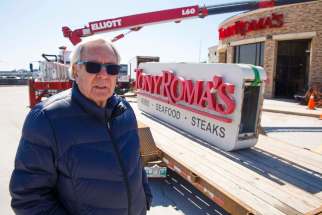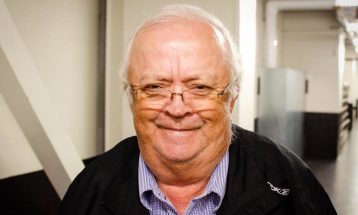Pallister criticized for Manitoba 150 statement Métis, First Nations leaders disappointed by exclusion of Indigenous people
Read this article for free:
or
Already have an account? Log in here »
To continue reading, please subscribe:
Monthly Digital Subscription
$0 for the first 4 weeks*
- Enjoy unlimited reading on winnipegfreepress.com
- Read the E-Edition, our digital replica newspaper
- Access News Break, our award-winning app
- Play interactive puzzles
*No charge for 4 weeks then price increases to the regular rate of $19.00 plus GST every four weeks. Offer available to new and qualified returning subscribers only. Cancel any time.
Monthly Digital Subscription
$4.75/week*
- Enjoy unlimited reading on winnipegfreepress.com
- Read the E-Edition, our digital replica newspaper
- Access News Break, our award-winning app
- Play interactive puzzles
*Billed as $19 plus GST every four weeks. Cancel any time.
To continue reading, please subscribe:
Add Free Press access to your Brandon Sun subscription for only an additional
$1 for the first 4 weeks*
*Your next subscription payment will increase by $1.00 and you will be charged $16.99 plus GST for four weeks. After four weeks, your payment will increase to $23.99 plus GST every four weeks.
Read unlimited articles for free today:
or
Already have an account? Log in here »
Hey there, time traveller!
This article was published 12/05/2020 (2045 days ago), so information in it may no longer be current.
Premier Brian Pallister has come under fire from Métis and First Nations leaders after his Tuesday statement marking Manitoba’s 150th anniversary did not mention the contributions of Indigenous people.
Pallister said during a Tuesday news conference he intentionally left Indigenous people out of the statement.
“I guess I basically offended everyone by trying to be inclusive,” Pallister told the Free Press during the conference.
That morning, he released a 283-word statement that recognized immigrants, religious minorities and volunteers — but lacked any mention of First Nations or Métis people.
Manitoba was the only province founded by Indigenous people, after Métis leader Louis Riel marshalled the Red River Resistance against the Crown’s attempt to fold the region into Confederation without consultation.
Riel wanted the area to become part of Canada, but only if that included a fair deal for Métis people and the region. He was hanged by the federal government in 1885.
“There are so many things he can be proud of; instead he took the negative approach and said ‘I’m not going to mention them and if I don’t mention them, nobody will care.'”
– Manitoba Metis Federation President David Chartrand
Pallister later acknowledged that history Tuesday.
“The Métis people are at the forefront of Manitoba’s history and will be a massive part of (our) future as well,” Pallister said in response to reporters’ questions.
He was defensive Tuesday about why his written statement and spoken remarks left out any mention of Métis and First Nation people.
“I also didn’t mention veterans, or pioneers or immigrants who helped form our population pre-Confederation,” the premier said.
“We’re a province of incredible diversity, so I didn’t choose to single out any group in my statement. I chose to think of us all as Manitobans in the context of Manitoba’s 150th.”
Manitoba Metis Federation President David Chartrand accused the premier of deliberately ignoring Riel.
“There are so many things he can be proud of; instead he took the negative approach and said ‘I’m not going to mention them and if I don’t mention them, nobody will care,’” Chartrand said.
In February, the MMF decried the Manitoba 150 host committee for giving Riel no prominent role in the programming.
That prompted the federal Liberals to look into the matter, as Ottawa has partially funded the committee, which operates at arm’s length from the Pallister government.
“He has a very hard time reconciling his own issue with Indigenous people, and unfortunately he’s carried that into the premier’s office.”
– Long Plain Chief Dennis Meeches
“There are so many things that Riel was able to accomplish… and to get insulted by a premier in this new millennium? It’s unfortunate,” Chartrand said.
Long Plain Chief Dennis Meeches, whose First Nation sits near Pallister’s family farmstead, was unsurprised Pallister didn’t mention Indigenous people.
“That’s basically what we’ve come to expect from the premier,” said Meeches.
“He has a very hard time reconciling his own issue with Indigenous people, and unfortunately he’s carried that into the premier’s office.”

A year into his term as premier, Pallister caused an uproar for referring to disputes over night hunting as “becoming a race war” in early 2017.
Since then, Indigenous groups have complained about a lack of partnership in child-welfare reforms and crime-reduction initiatives, as well as scant consultation over flood-channel outlets in the Interlake.
However, Pallister has won plaudits from the Assembly of Manitoba Chiefs for collaborating on things like mining protocols, funding Bear Clan patrols and transferring control of northern airports.
The province’s northern chiefs released a statement highlighting the role of First Nations in forming the province shortly after the premier’s statement.
“Although Manitoba has been a province for 150 years today, First Nations citizens have lived on these lands for time immemorial,” wrote Grand Chief Garrison Settee of the Manitoba Keewatinowi Okimakanak.
“Despite the multiple and ongoing attempts to eliminate and assimilate our people, we persist.”
— with files from Larry Kusch and Julia-Simone Rutgers
dylan.robertson@freepress.mb.ca




